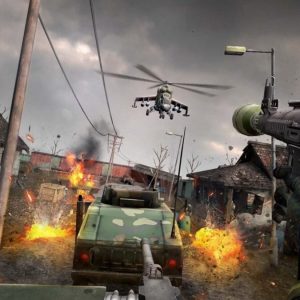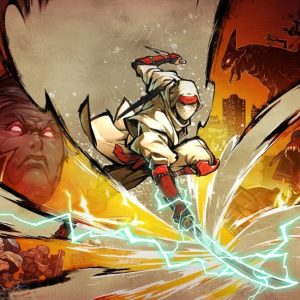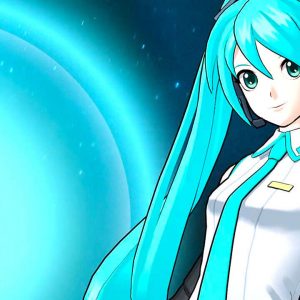For the last week, there’s been a lot of online discussion on Sony’s newly-launched multiplayer shooter, Concord. But it’s not because everyone’s playing it – it’s because seemingly no one is.
Plenty of games don’t sell well at launch, but observers have latched onto Concord’s dramatic failure due to its high-profile nature as a Sony first-party game, and its shockingly low Steam concurrent player numbers at launch. Upon its August 23 debut, Concord only had 697 Steam concurrent players, and it hasn’t risen any higher since. At the time I’m writing this, 130 entire people are playing Sony’s brand new, first-party game on Steam. That’s real, real low, even for a game with middling critical reviews (we gave it a 7/10, which at IGN means it’s “good”).
So, what happened? Why did a big Sony first-party game get sent out to die immediately? Is it actually selling badly, or are we just reading the numbers wrong? As usual when questions of this nature crop up, I asked a bunch of professional industry analysts to explain it to me.
Is Concord actually selling that badly?
Unfortunately for Sony…yeah.
While historically low numbers like the ones being experienced by Concord have a tendency to be used to drive narratives that don’t always paint a full picture, that’s not what’s happening here. Liam Deane, principal analyst at Omdia, said, “The Steam numbers are so bad that even without the exact data on the PS5 side we can be pretty certain that the game is doing very badly.”
Other analysts were able to share a bit of insight on the PlayStation side with me. Per Circana analyst Mat Piscatella citing Circana’s Player Engagement Tracker, on Monday August 26, “Concord ranked 147th in US PS5 daily active players across all titles, with fewer than 0.2% of Monday’s active PS5 players playing the game.” And analyst Simon Carless, who authors the GameDiscover.co newsletter, estimated that Concord’s total sales are sitting around 10,000 units on Steam, and around 15,000 on PlayStation (he responded to my email Wednesday, August 28, 2024).
Many of the analysts I spoke to lamented the reality. As they pointed out, Concord has been in development for years now, a substantial financial and time investment for Sony. And incredibly talented people worked on it: it’s well-produced, and as Midia Research analyst Rhys Elliott specifically notes, it’s fun to play. But, Elliott continued, “sadly, making a fun, high-quality shooter is not enough in the oversaturated live-service space these days.”
Why Isn’t Concord Selling?
Usually, when I reach out to analysts for comment on a piece like this, they largely have similar assessments of the big picture but can offer differing perspectives on certain details. In the case of Concord, everyone I spoke to agreed on the reasons it had failed. Concord suffered from poor marketing, a high price point, and most critically, a lack of differentiation in an oversaturated genre.
Start with the marketing. According to Piscatella, Sony dropped the ball on this front, badly damaging its ability to build momentum ahead of release. He said it suffered from “low awareness and purchase intent among video game players” and indicated that Circana’s PlayerPulse was showing that as of July, only a very small percentage of players were even aware Concord existed to begin with. Retail promotion was limited, “with just a handful of web placements across GameStop, Best Buy, Target, Walmart and the PlayStation Store.” Piers Harding-Rolls, research director at Ampere Analysis, agreed, saying that “while there has been trailers and some gameplay reveals for Concord, pre-launch promotion for the game appears to have been relatively limited.” And Joost van Dreunen, NYU Stern professor and author of the SuperJoost newsletter, added that since Concord was a new IP that marketing was sorely needed, as it “lacks a pre-existing fanbase to bolster its launch.”
At $40, Concord also suffered from what was considered to be an overly high price point given that its main competitors are free-to-play. As Carless pointed out, high-skill multiplayer shooters can struggle to gain traction, because players will only “shift” their preferred game if all their friends also agree to do so. Even then, players may be reluctant due to sunk cost fallacy around the various cosmetics and other perks they’ve picked up on their preferred game over time. This is also a problem, he says, for content creators, who won’t know in advance if their audiences will be interested in a new game they’re considering switching to.
For free-to-play games, players can at least jump in, try something out, and see if it sticks without a high commitment cost. But with Concord, the $40 price makes players unlikely to give it a shot in the first place, and van Dreunen adds that this is even less likely near the end of a console cycle when players are more reluctant than usual to take a chance on new games.
“A tight-knit group of players might be willing to take a chance on a new game for free, but paying $40 is a big ask in today’s macroeconomic climate,” Elliott observed. “Launching Concord as a premium game limited its audience numbers and user acquisition. The more people who play a game, the more appealing it is. Network effects are crucial for building a healthy, engaged ecosystem.
“Concord should have launched free-to-play – or at least as part of the PlayStation Plus subscription – to have a fighting chance in its overcrowded genre. It is not too late for this to happen, of course, but the damage might have already been done. First impressions matter.”
Every analyst I spoke to also hammered home what may be Concord’s biggest problem: lack of differentiation. Harding-Rolls noted that when Concord started development, Sony was banking on the then-hot trend of multiplayer shooters such as Overwatch. But in the years since, other studios made the same bet, many to great success.
“Since then, we’ve had a few more big budget hero shooters come to market – Apex Legends, Valorant and Overwatch 2 – each with their unique gameplay attributes,” said Harding-Rolls. “All three of these games are played by millions of gamers every month and dominate this category. Concord’s gunplay compares most closely to Overwatch 2 and overall the hero shooter market is already well served with a collection of very strong free-to-play titles.”
It also doesn’t help that Concord released on August 23, 2024, just three days after Black Myth: Wukong. Though the two games are significantly different, it’s hard to deny that the launch of the former overshadowed the latter in terms of marketing, hype, and sales. For what it’s worth, Concord’s release date was announced five months after Black Myth: Wukong’s. For one reason or another, Sony did not opt to nudge the game out of its wake.
What does this mean for Sony and live service games?
I asked all the analysts I spoke to if this means live service is over, especially for Sony. Hardly, they all say – but this should serve as a reality check.
“Live service games have a high failure rate,” Deane said. “There are many reasons for that but the main one is because they rely on network effects. Sometimes a single-player game can have a slow launch but eventually find its way to success. But the clock is now ticking on Concord in a big way because unless the player counts pick up soon there’ll be nobody to play against. So even if you personally would like to give it a try, there’ll be nothing to play. But while the risks are big, so are the rewards. It’s no secret that many of the highest-earning games in the market today are live service games. According to our data, only about 16% of the total revenue of the games market now comes from traditional full-game sales. Publishers are going to keep chasing that 84%.”
As for Sony itself, Deane expects it will continue chasing live service. Helldivers 2, after all, was a huge hit earlier this year. “Though clearly they won’t want any more Concord-level disasters, if half of their forthcoming slate of live service games over the next few years succeed, that won’t be a bad result.”
Elliott agreed. “It only takes one big live-service win to generate billions upon billions in revenue and unlock new audiences – two things PlayStation very much wants right now, as the console business is facing growth challenges and reaching saturation. That said, I also expect some resources to be redirected to strategies that are working better for the company: PC launches and cross-media/transmedia, for example.”
Nevertheless, analysts suggested that Concord is a perfect example of the dangers of AAA companies chasing trends, especially with how long game development cycles have become. Elliott pointed out a growing list of failures in the space, even from major companies: BioWare’s Anthem, Crystal Dynamics’ Marvel’s Avengers, PlatinumGames’ Babylon’s fall. Some developers, he notes, have even canceled projects in advance, such as Sega with Hyenas or PlayStation’s The Last of Us Online.
“Pivoting to live services is high-risk, high-reward venture, and the risk is heightening to levels that might not be worth it for many AAA console/PC publishers that aren’t already active in the space,” he said.
Concord’s failure has attracted attention due to the contrast between its status as a Sony first-party title in a popular genre with high production value, and the overwhelming cricket sounds that accompanied its launch. But the story of its failure is mundane. Sony, for whatever reason, chose not to market the game heavily enough to ensure players were aware of it. It chose to sell it at a premium price point despite all its serious competition going free-to-play. Had these factors been different, Concord might have stood a chance despite its relative lack of standout characteristics in an oversaturated genre. But even then, Concord was always fighting a difficult battle – a battle that will only get more fierce the more multiplayer shooters go to market in future years.
As Mat Piscatella summed up, “Sometimes everything that can go wrong does go wrong. Although it’s quite rare to see everything go this wrong.”
Rebekah Valentine is a senior reporter for IGN. Got a story tip? Send it to [email protected].























